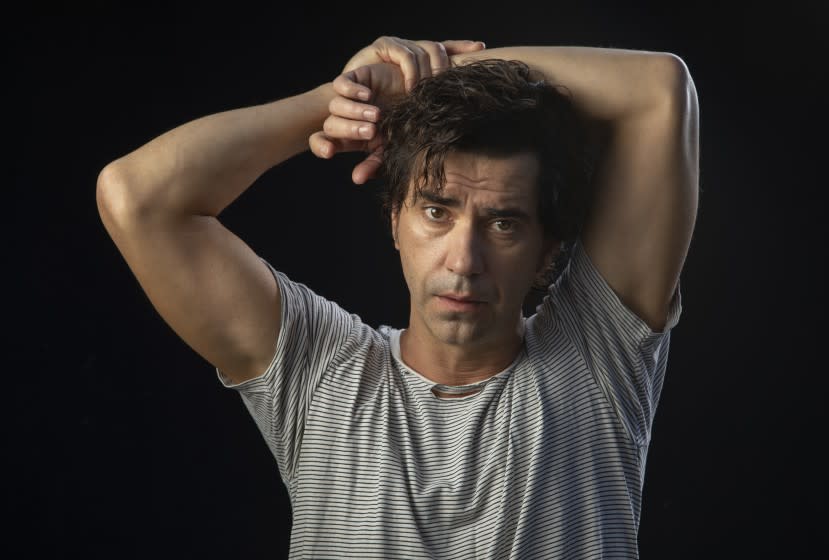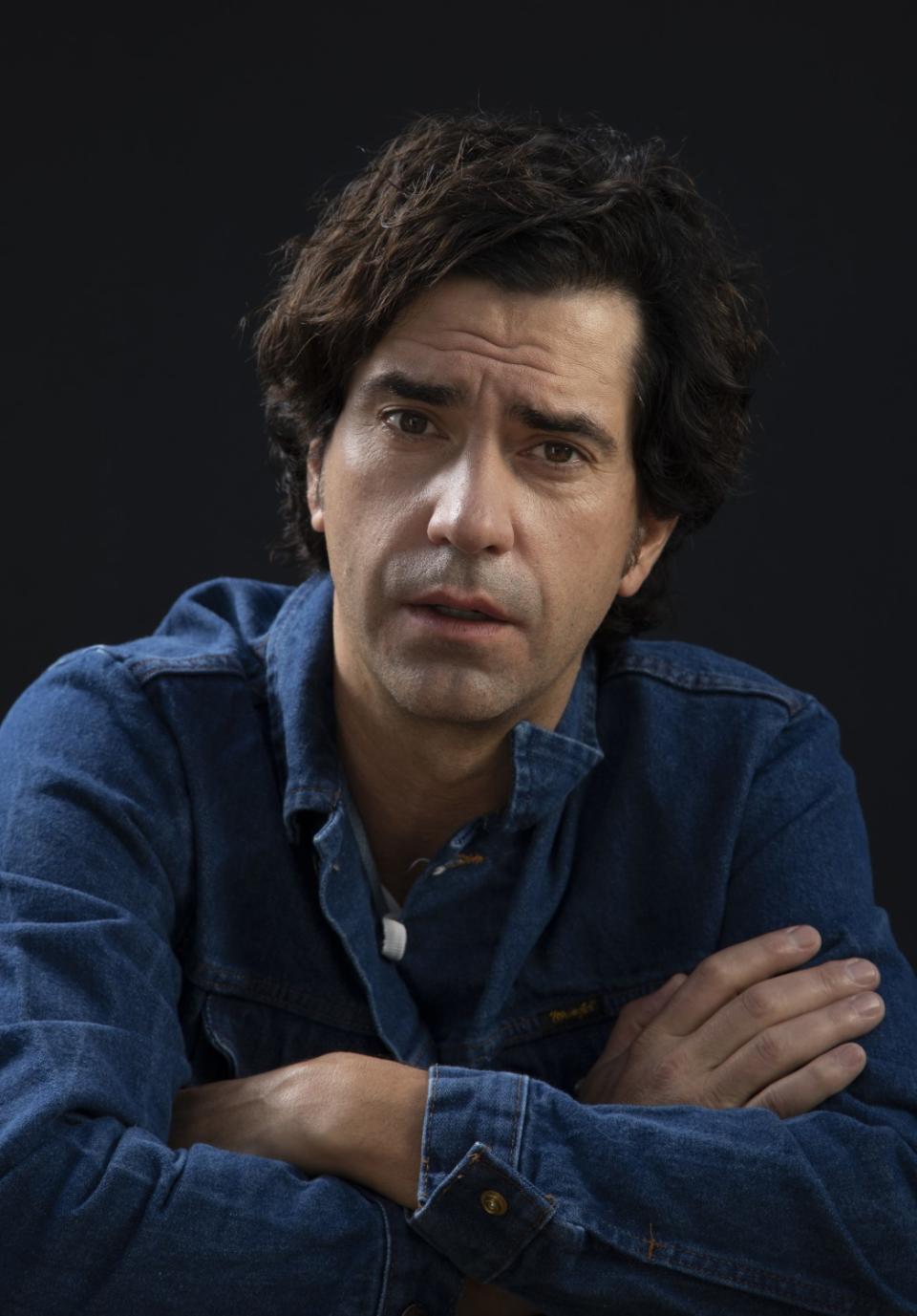There's a new hot priest in town. And Hamish Linklater would happily play him 'forever'

- Oops!Something went wrong.Please try again later.
- Oops!Something went wrong.Please try again later.
- Oops!Something went wrong.Please try again later.
Warning: This story contains spoilers about the final scenes of "Midnight Mass."
On his first day shooting "Midnight Mass," Hamish Linklater split his pants.
The 45-year-old star of Mike Flanagan's Netflix series (premiering Friday), about a dark force stalking an isolated island community, was already trepidatious about having to shoot nine pages of monologue on the first day. "I was in a pretty white-hot panic, but I was so excited to finally get to go back to work, and it was so emotional," he said.
"My jeans split right down from crotch to knee. It was just a reminder of the times we are in. You can make all your best plans but it's one foot in front of the other with a lot of wind blowing where you probably wish it wasn't."
In the series, which adds to Flanagan's growing portfolio of genre projects for the streamer (including "The Haunting of Hill House" and "The Haunting of Bly Manor"), Linklater plays Father Paul, a charismatic priest who mysteriously moves to Crockett Island and manages to convince his despondent parish to believe in miracles. Shooting took place in the midst of the COVID-19 pandemic, and "through luck but also a lot of preparation and diligence by the cast," the production managed to get through a four-month shoot unscathed.
"It was just this massive release, finally getting to talk to people and laugh and really scream and shout," said Linklater. "We're making this show about an island community, and an island community spirit sort of overtook us as well because of the circumstances under which we were shooting."
The Times caught up with Linklater to talk genre storytelling, delivering monologues and the similarities between Catholicism and addiction.
What's been drawing you to genre storytelling lately, and what do you think draws genre storytellers to you?
"Midnight Mass" just happens to be a genre show. Mike's writing was just so beautiful and had such an evangelical rhythm to it. And that was lucky because my ever-growing kryptonite is memorizing lines. I got the first three scripts and nine pages of monologues to audition with, and then the night before they gave me another five pages of monologues. But when there's that great rhythm to it, it just goes in like a nursery rhyme or an earworm. Earworm dialogue is the best.
What attracted you to this role in particular?
I mean, the scale of the role really was what was so exciting. Getting to use this beautiful language and having these beautiful sermons to deliver was thrilling. And what I hadn't really anticipated, and no one of course could have anticipated at the time, was that we were going to go into this lockdown and be in our houses. I'm a theater actor. I grew up in a theater company sitting outside watching plays. I have a certain extroverted bent, but I had no idea [if] I was going to get to actually perform in front of people. Having a parish and a congregation, getting to do these exquisite monologues, it was just like bursting out of a cave. It was such an incredible gift.
Did you pick up any artistic hobbies to fill in the gap left by acting?
I actually did a lot of cooking. I'm the cook in the household anyway. But for a brief sliver of time, I in fact became a chef. I would be like, "What are the ingredients we have here today? Google, what do you think I could do with this?" And then suddenly, it's edamame coconut rice instead of just Mr. Box's pilaf. And I became an artist in childcare. I have three daughters, so that was a wonderful skill to keep honing.
What do you think it is about religion and the Catholic church in particular that makes it fodder for so many genre stories?
The show works on two levels: One, this terrible peril that I think a lot of people [feel] going into church on Sunday like, "Oh, my God, am I going to stay awake?" The way that Christian churches keep you awake is hell. You get a lot of hell. And you also get a lot of devils and demons in horror. So there's crossover there for sure.
And the other way is that this show is so much about faith but it's also about addiction. There are two different ways of dealing with addiction, and one is the threat of succumbing to those urges and cravings. If you do that, you get hell, and if you don't, you get heaven. There's so much negativity and shame that comes along with addiction that is often used to cure [it]. Like, "You're out of control. You have to give yourself over to [a higher power]," basically saying you're a sinner. But then there's another way of dealing with addiction, which is like, "Things are going to be really positive if you don't give in. You're actually going to feel better, you're going to have a fuller day-to-day. If you're striving toward the light, the light will shine back on you." So I think the heaven and hell of it is also interesting just in terms of the therapy of dealing with addiction.
Are you a fan of Stephen King? And what was it like working with Mike Flanagan, a superfan?
Yeah, totally. I was like a massive "Gunslinger" fan, I wasn't so much into the horror-y side of things. I'm not a horror [fan] because it scares me too much. But I had seen "The Haunting of Hill House" and [Flanagan] does something, which I think he does in "Midnight Mass" as well, which is get under your skin, but then he gets under your ribs as well and dabbles his feet around your psyche. With "Hill House," you're talking about siblings. You're talking about family and the horror of family.
Your character is extremely charismatic. Did you base your performance on anyone or anything in particular?
I based my performance on my ideal of my best version of myself. And I also watched Raúl Juliá. I watched "Romero," and then I started watching more and more Raúl Juliá, and I was like, "Well, I'm not gonna be that exciting," but I love him so much. It's beautiful. It's a stunning performance.
Your partner, Lily Rabe, has been a fixture of the "American Horror Story" series for so long. So what's it like being part of a horror supercouple?
I think both of us consider ourselves very lucky to find ourselves in the good favor of such remarkable storytellers. The genre is a bonus. But what is awesome about it is that we both come from theater backgrounds, and they don't ask you to mumble, they don't ask you to just think it, you get to play big emotions and you get to play wonderful stakes. So that's really an exciting part of it. But there is a huge amount of work by my partner that I have never seen because I find the genre so frightening.

Warning: Major spoilers about the ending of "Midnight Mass" follow.
Do you think Father Paul really looked at that creature and believed it to be an angel, or was he just desperate for a second chance with Mildred?
Father Paul's confession and his exposition of the experience of the encounter with the angel is so visceral — and sensual, even — it feels like the experience makes sense to him as a holy and miraculous encounter. And then he has all of this scripture in his head that clicks into place like, Every time an angel of the Lord appears, they were so afraid. That was my experience, this must be an angel of the Lord. I think it's not until the angel has really revealed itself to be an agent of some other force that the veil is lifted and he sees what his own personal motivations might have been.
Would you ever be willing to return to the role to flesh out Father Paul's illicit romance with Mildred?
I'm always told not to use dry humor in print, because I was [thinking], 'Well I'd go back for the illicit.' I would love to play this guy forever. I mean, my God, if I got Mike's direction and [Michael] Fimognari's cinematography and this language ... it's so fun.
Since being turned doesn't change who you are fundamentally as a person, why do you think so many of the people in the town went crazy that final night and went on a murderous rampage?
I wonder if there's a metaphor there. There's that dry humor that I'm not allowed to use in print. I mean, gosh, mob mentality isn't just alliterative, it's an actual psychological syndrome. We all would like to believe we'd be the vampire that once bit was like, "That's it. I'm fasting."
Is it safe to assume there's no preexisting media representation of vampires in this world, much like there are no zombies in "The Walking Dead" universe?
It's like when they do an adaptation, like in "Succession," does "King Lear" exist in that universe or do they just cut out what they're adapting? I don't think we ever use the V-word. Maybe ["Dracula" author] Bram Stoker was never born in that universe.
If so, maybe Bev would have had the idea to go to ground earlier like in "True Blood."
Totally. Yeah, she does not know the rules of the genre. She just goes full ostrich.
This story originally appeared in Los Angeles Times.

